And actually I think that it is against this body (as if to erase it) that all these utopias have come into being. Michel Foucault, the utopian body (1966)

Episodes from the TV series Lost often open with a character's eye.
It is here, irreparably: it is never elsewhere. My body, it's the opposite of utopia: that which is never under different skies.
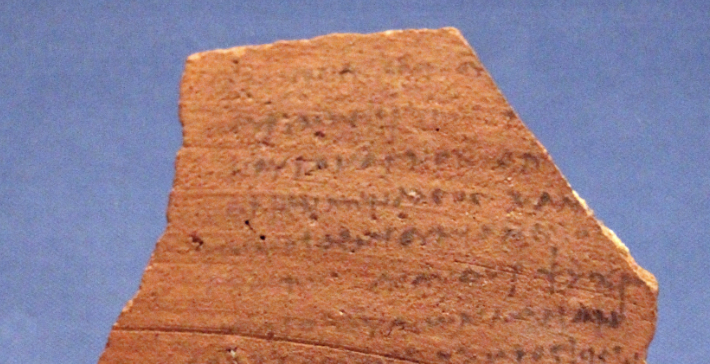
Sappho Fragment 2, Wikipedia
here to me from Krete to this holy temple
where is your graceful grove
of apple trees and altars smoking
with frankincense
Trans. Anne Carson
Utopia is a place outside all places, but it is a place where I will have a body without body. The first utopia is the utopia of an incorporeal body.
altars for hetairai
the girls smuggled weed into greece
and roamed the symposium as two.
the hetaira in the frieze above
pouring wine for her patron, in trance
turned to her friend on another frieze:
do you think they made altars
as I did for you? that one with thin shoulders
like mine; and the other, soft, sore eyes
like you. had they held their hands
above bright faces yet, with song & death shunned
outside of a soundless, autumn window?
had they also, like others before
held the other's neck against dead mirrors
and, invoking our names,
drank lavender gin in plastic cups,
as if you were I but stabbed in the chin
with two streams of still & steady blood,
and no lyres and less words for love,
outside that young & dying bedroom —
while others waited at the door;
— did she, demanding that she swear omertà,
concede in tremors, at last:
I think I've touched you everywhere.
I can see the back of your shoulders
I can see every hair on your skin
I can see the impious blotches & burns
I can see all the places you missed when you were shaving

Foucault said that there are two utopias of the body. First, the land of fantasy: where bodies are beautiful, malleable, and magically powerful. Then, there is the land of the dead: the mummy is the negated and transfigured body; the mummy is a utopia. So are the death masks of the kings of Mycenaean Greece: in death, the body becomes solid and eternal.
Nowheres are the native lands of every people borne from negation. The land of fantasy behind us, and the land of death ahead. In all of our bodies we inherit the utopias our elders designed for us.
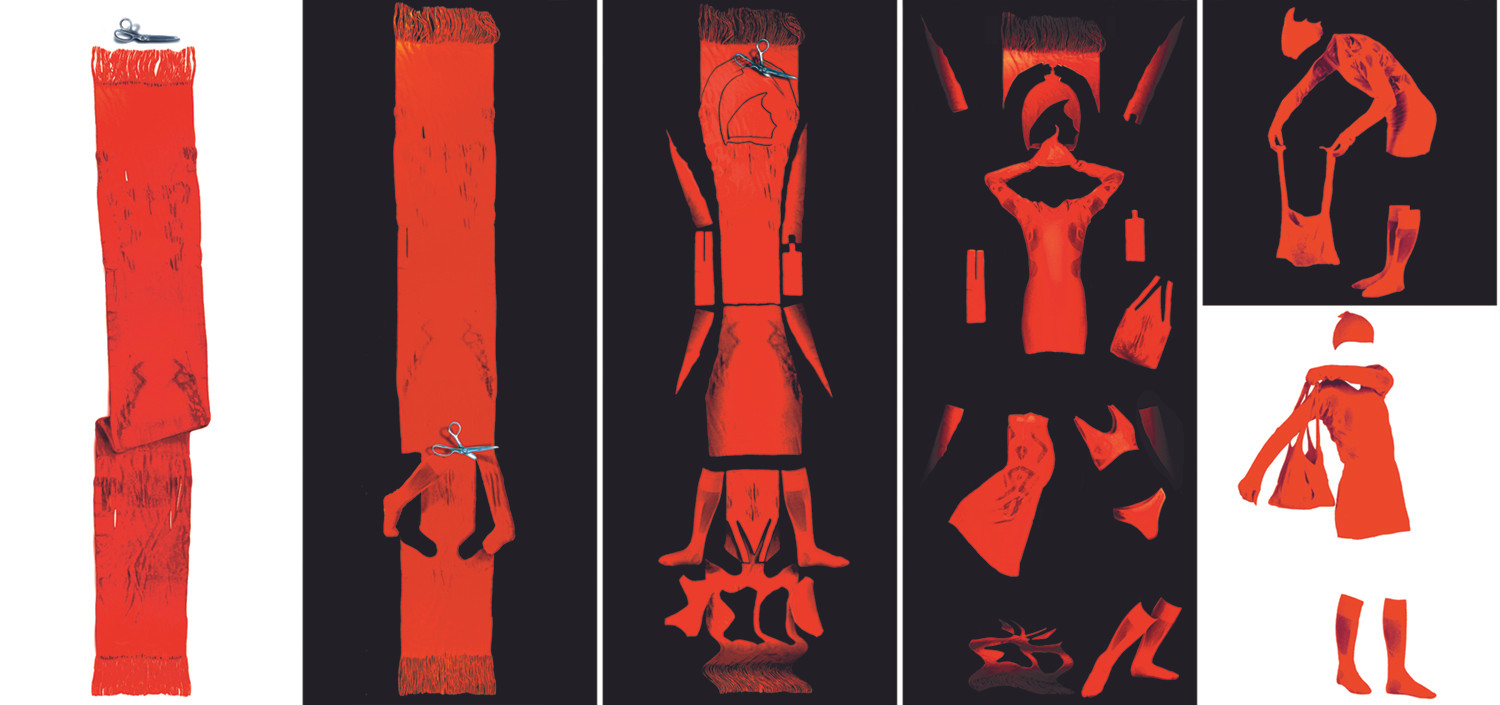
Issey Miyake, Fujiwara Dai. A-POC Queen Textile, 1997. From MoMA online
blazon; argot
head, eye, ear, nose. nostril. mouth, lip —
philtrum, jaw, mandible, gingiva — tooth?
tongue, throat (adam's apple), spine. arm: elbow,
wrist, hand. Fingers, thumb, nails, skin, hair. Chest;
breasts, stomach; ████ — (███) — ███, ███,
hole. Leg. thigh, knee, shins, bone. ankle, foot, toes; brain, vessels, veins.
mouth teeth tongue lips salivary
glands parotid glands submandibular glands sublingual
glands pharynx esophagus stomach small intestine
duodenum jejunum ileum large intestine cecum ascending
colon transverse colon descending colon sigmoid colon rectum
liver gallbladder mesentery pancreas anal canal appendix nasal cavity pharynx larynx trachea bronchi
bronchioles and smaller air passages lungs muscles of breathing
kidneys ureter bladder urethra ovaries fallopian tubes uterus
cervix placenta cornea iris ciliary body lens retina subcutaneous tissue
but if you keep drawing my eyes on your hands
i'll think of the four times in life, when I was held or folded over
you, by worried family or frozen, wooden friends
who had things to say, all for good reason. look at how short
your stumbly legs; look at the way you walk & stand and
all those dark rings around your neck and nipple. how uncouth your rotund hands
as if you've already given birth. you did not know,
although I tried to tell you, that I am becoming unbeautiful;
there is nothing inhuman under my nose. I have held myself below a memory
like a blunted butcher-knife. there is no dance, drug, or possession
that bends a body towards a mirror or death. I've looked
at you once, upwards, from the dark. against my will.
and though Eurydice, hideous, would fear a sun, I
stood down, in stupor or rapture, still.

Kiki Smith,Untitled, 1987-90. Twelve bodily fluids in bottles: tears, urine, milk, blood, saliva, vomit, sperm, etc. From MoMA online.
There’s no need for a soul, nor a death, for me to be both transparent and opaque, visible and invisible, life and thing. For me to be a utopia, it is enough that I be a body. All those utopias by which I evaded my body–well they had, quite simply, their model and their first application, they had their place of origin, in my body itself, I really was wrong, before, to say that utopias are turned against the body and destined to erase it. They were born from the body itself, and perhaps afterwards they turned against it. … My body, in fact, is always elsewhere. It is tied to all the elsewheres of the world. And to tell the truth, it is elsewhere than in the world, because it is around it that things are arranged. It is in relation to it–and in relation to it as if in relation to a sovereign–that there is a below, an above, a right, a left, a forward and a backward, a near and a far. The body is the zero point of the world. There, where paths and spaces come to meet, the body is nowhere. It is at the heart of the world, this small utopian kernel from which I dream, I speak, I proceed, I imagine, I perceive things in their place, and I negate them also by the indefinite power of the utopias I imagine. My body is like the City of the Sun. It has no place, but it is from it that all possible places, real or utopian, emerge and radiate.
entheogenesis
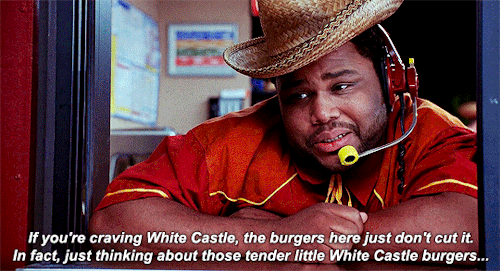
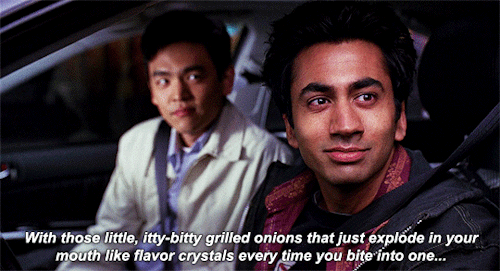
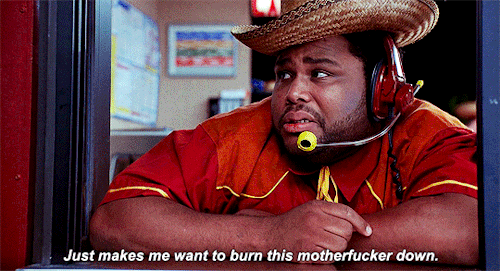
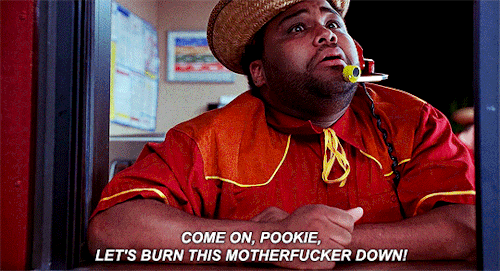
Harold & Kumar Go to White Castle, 2004. Images from Tumblr
the harold & kumar movies give us a narrative of entheogenesis. would you go so far as to call it utopic? in my mind, utopias are not places where evil or negative desires cease to exist; rather, a utopia is where things eventually end up alright. in a very political sense, the utopic impulse is often borne from the negative inflections of emotion & desire. every moment of anger, disappointment, jealousy, bitterness arises from the collapse of one's utopic delusions into the real world.
the body is an utopia because it can heal.
in harold and kumar, they slump by in college, things go wrong, and the nights slide them by. but things turn out alright because they're young, because they're socially or economically cushioned, because god or george bush appears, and so they do make it to white castle. i've never been to a white castle; there is a 24-hour white castle on myrtle ave. maybe this is the summer i go to white castle.

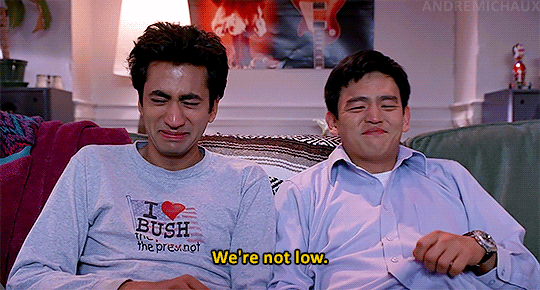
utopia as the rice purity test
click here to take the rice purity testLove also appeases the utopia of your body... it hushes it, it calms it, it encloses it as if in a box, it shuts and seals it. This is why love is so closely related to the illusion of the mirror and the menace of death. And if, despite these two perilous figures that surround it, we love so much to make love, it is because in love, the body is here.
about
>an epideictic for the body as utopia
>aristippus contra aristotle; bodies against minds; pseudohellenistic html
hedonia is a brief exhibit exploring parts of a radio lecture a young Michel Foucault delivered in 1966, translated by Lucia Allais and Caroline A. Jones and published as "utopian body" in Sensorium: Embodied Experience, Technology, and Contemporary Art, MIT Press, 2006, 229-34.
All italicized blockquotes are taken from "utopian body." All images taken from source in captions or public domain. All quotes attributed to author or translator. The rice purity test is adapted from source code. All other texts written by me.